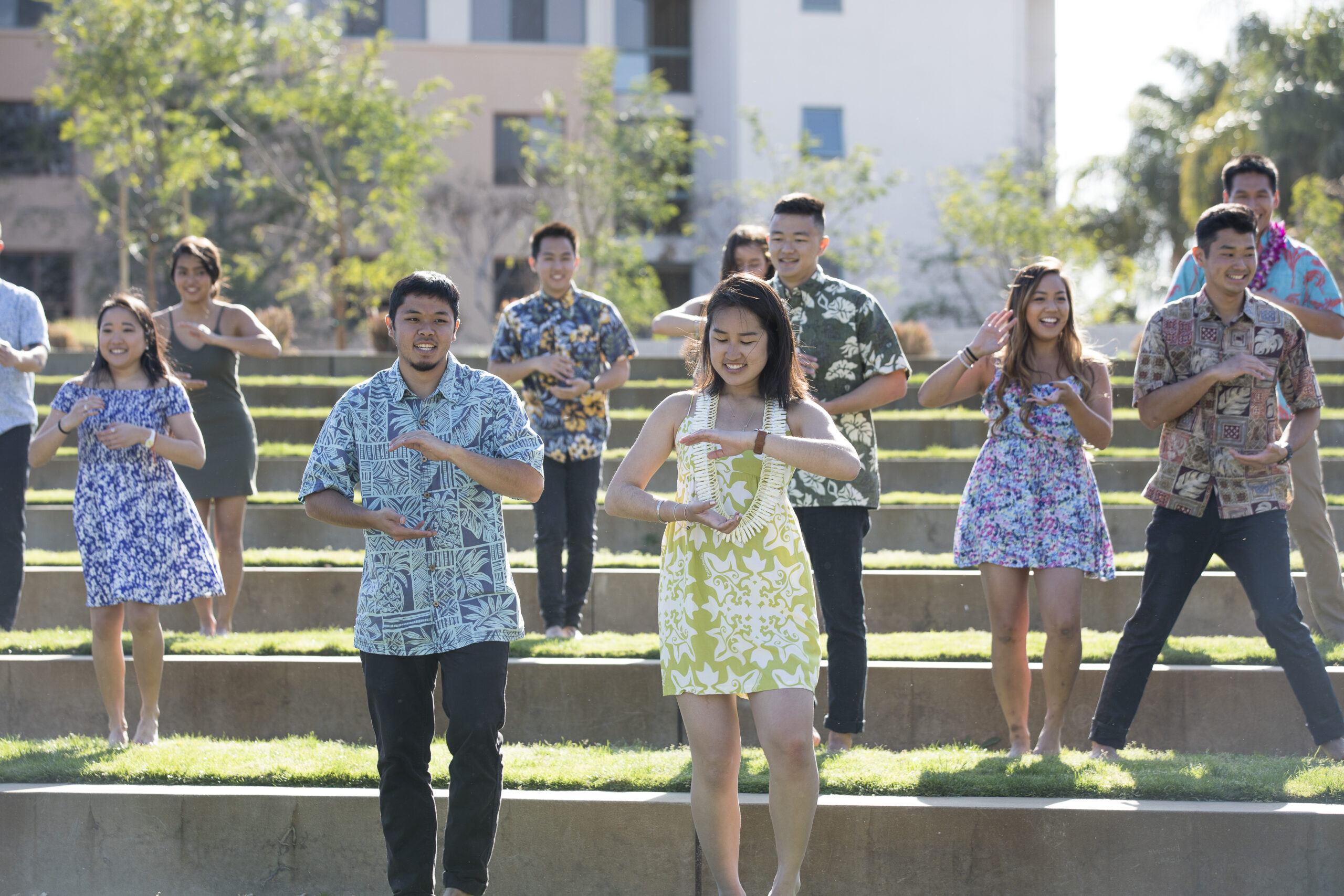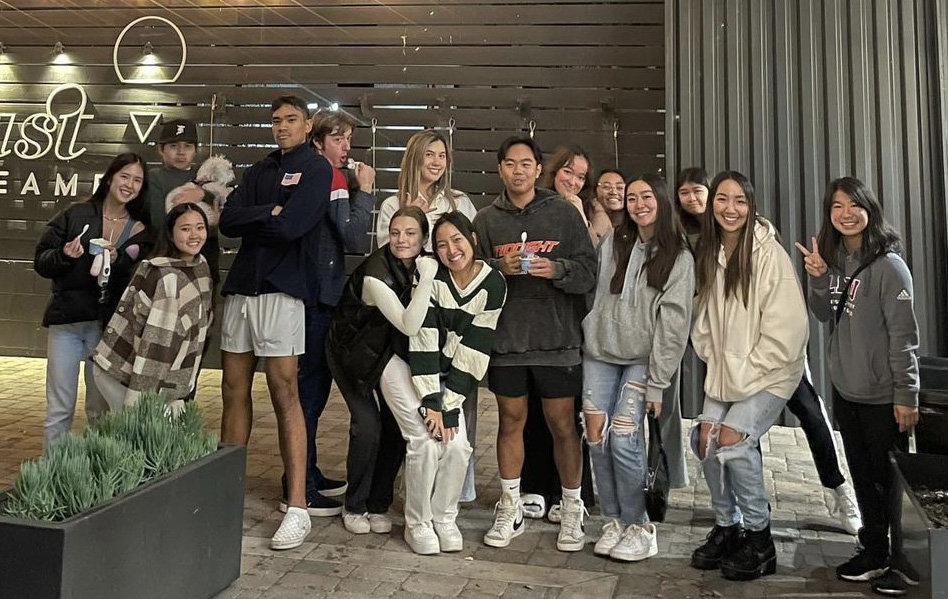
Each spring, Nā Kōlea, LMU’s Hawaiian student organization, hosts an annual lū’au to celebrate the hospitality, culture, and Aloha spirit of Hawai’i with the campus community. This event has been on hiatus since the pandemic, so 2023 marks its 49th year and its return to LMU on Sunday, March 12, from 3-7 p.m. on Sunken Garden. Tickets are $35 for general admission, $20 for children ages 6-12, and free for children five years old and under and can be purchased here.
This historic tradition includes cultural food and entertainment as the students bring a piece of Hawai’i to Los Angeles and have been one of the largest, if not the largest, event by any intercultural organization here at LMU. Nearly 50 years ago, the lū’au began as an event that hosted 30 attendees in what is now known as The Lair in the fall of 1973, and the second took place in the spring of 1975. As Nā Kōlea’s presence grew throughout the years, the attendance at the annual lū’au climbed to nearly a thousand people at one point in our history. There are a handful of other Hawai’i Clubs at other universities in Southern California that host an annual lū’au, but LMU’s Nā Kōlea has been noted for hosting some of California’s largest lū’au.

“This was a testament to our awesome LMU student base and the natural beauty of our campus,” said Cole Ichikawa, ’24, an environmental studies major from Honolulu. “Nā Kōlea strongly exemplifies what it means to become a global citizen because, to me, it means understanding, accepting, and respecting individuals and cultures of all kinds. Becoming a global citizen is not merely setting aside differences but celebrating these differences of where we are from. Nā Kōlea creates an intercultural environment for global citizens to thrive together on campus. Nā Kōlea has provided beyond just a bridge between our island home in Hawai’i to L.A. but has strived to foster an aloha-filled environment where students worldwide can unite through differences. Our club accepts all students with open arms, regardless of where you are from or which culture you identify with. That is something that we as a club have historically taken pride in, and we are eager to continue carrying this torch of love and aloha.”
This year’s theme is Ka Lā Hiki Ola, which means “the dawning of a new day,” a sentiment embodying our organization’s journey as we emerge from the pandemic. This is an open-seating event, but you can reserve a table by purchasing at least eight tickets. The event will also feature special guest performer Common Kings, an American, Hawaiian, and Samoan reggae band from Orange County, California. The band’s debut album, Lost in Paradise, was nominated for a Grammy Award. Common Kings’ style and music is a collection of inspirations orchestrated into an array of head-rocking beats, feel-good vibes, and emotional fever. Their crazy, fun-loving attitude compliments their live sound, producing phenomenal hits with rock, reggae, and island influences. These influences originate from each band member’s love for various genres and widespread knowledge of music.
Some of the other highlights for this year include the following:
- Rutt’s Hawaiian Catering will provide a full Hawaiian meal from 4-5 p.m.;
- Student hula performances;
- Multiple raffles with great prizes,
- And games.
For Nā Kōlea advisor Al Ka’imipono Tipon Jr., the return of the lū’au holds special significance because it stands to honor the memory of his late wife, Adele Tipon ’85 (known as Aunty Koa), who was a very active member of Nā Kōlea during her time at LMU. She would also support Tipon when he became the club’s advisor in 1995 when Nā Kōlea President Kapua Anderson ’96 asked him, and he remained an advisor until he left his work at LMU in 2016. In 2021, Aris Mosier, director of Asian Pacific Student Services, asked him to return as an advisor and help continue this Hawaiian tradition at LMU. “The club has a deeper importance as my late wife, and our two children are LMU/Nā Kōlea alumni,” said Tipon. “My wife would cook meals for the organization’s general meetings, 10-course Thanksgiving dinners, and bring students to our house for the holidays. When our children, Ku’ulei Tipon ’09 and ’11 and Kalei Tipon ’12, attended LMU, she was even more involved as a parent.”
The familial bond rings true for other Nā Kōlea, including senior Brendan Parke ’23, a finance major from Honolulu, who joined the student organization during his first year at LMU because he was born and raised on the islands. “I wanted to meet new people with similar backgrounds and values,” said Parke. “Nā Kōlea is a club driven to unite people from Hawai’i and anyone who wishes to be a part of the Hawai’i community at LMU. The club seeks to create a familial bond between the members and share the Aloha Spirit with the LMU and Los Angeles communities. The club provided comfort and community in a foreign environment.”
The Hawai’i club officially started at LMU in the spring of 1973 and was called Hui Kumulipo. Several students began it from Hawai’i with the support of Asian Pacific Student Services and the late Father Kileen as their advisor. The student organization’s name was changed to Nā Kōlea in 1985. The club was formed to ease incoming students’ transition from Hawai’i to California and university life through networking, activities, and campus involvement. Additionally, Nā Kōlea strives to share the Aloha spirit by being good students, athletes, and stewards of and for LMU. Its membership encourages students worldwide to embrace their desire to learn, live and share our mission. With more than 50 years of history, Nā Kōlea is known worldwide by several alumni.
“People from Hawai’i have had a significant presence on LMU’s campus for as long as I can remember, and even longer than that,” said Jordan Shiu, ’24, a computer science major from Honolulu. “There are people my father’s age, from Hawaii, who talk about LMU’s lū’au and the Hawai’i Club. We were going through old Hawai’i Club relics once and found a scrapbook from 1992-93 with pictures of LMU students in the Hawai’i club. There were pictures of them dancing the hula, hanging out, and hosting the lū’au. It is always amazing to see how long this club has had a presence on this campus, and it warms my heart.”



